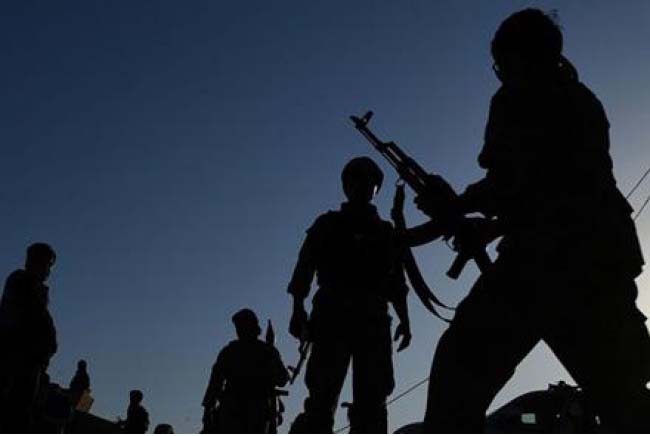The issue of terrorism has changed into a bone of contention between Kabul and Islamabad and the mutual relations hit rock bottom following the deadly attack in the southern Sindh province for which the self-styled Islamic State (IS) group claimed the responsibility. Pakistani officials did not only lash out at Afghanistan but also reportedly violated the country’s territorial integrity through firing rocket at Nangarhar province. The escalated militancy created a wide gap between Afghan-Pak officials, mainly after the establishment of the National Unity Government (NUG) and large civilian casualties caused as a result of the Taliban’s Omari Operation.
No wonder, Afghanistan bore the brunt of militancy within the last two years and Afghan officials believed that the Taliban orchestrated the attacks against Kabul government from across the border under the leadership of Mullah Akhtar Mansour and his successor Mullah Haibatullah.
With the Taliban’s intensified attacks, Afghans’ gleam of hope for a civil society and exercising rights and freedoms had disappeared and a large number of people took refuge to foreign countries. The worse came to worst with the emergence of the IS group and about 20 warring parties are believed to be involved in militancy in Afghanistan. Since we live in “the global village”, the security situation in a country is highly critical for its neighbors, the fact that we experience in our daily life. For instance, the declaration of “caliphate” in Iraq under Abu Bakr al-Baghdadi, has posed serious threat to its neighboring countries, including Afghanistan and Pakistan. Now, the loyalists to IS party are able to carry out deadly attacks against both Afghan and Pakistani nations.
It is most likely that warring factions seek to create political tension among countries. In other words, the militant fighters are just pawns in this dangerous game which is masterminded behind the veil. The mercenary fighters are widely involved in insurgency, rather than ideologue ones, so that they can alleviate their economic constraints and satiate their carnal desire through raping women, especially those who belong to ethnic minority groups (as Yazidi women were the victims in Syria). Hence, an emotional reaction and sensitive approach to the issue will aggravate the challenges more than ever before.
Following a spate of terror attacks in which more than 100 people have been killed, Pakistan had sealed its border with Afghanistan. Authorities later issued shoot-at-sight orders for those found trying to cross over. The Pakistan Army on Friday night said it targeted militant hideouts close to the Pak-Afghan border. Based on the international law, however, a country does not have the authority to violate its neighbor’s territorial integrity. It is an undisputable fact that terrorist have sanctuaries both in Afghanistan and Pakistan, as many leaders of terrorist groups were killed in Pakistani soil. Afghan government leaves no stone unturned to combat terrorism within its territory and Pakistan is also supposed to fight insurgency and eliminate the Taliban’s safe havens on her own soil. To put it succinctly, “Afghanistan is a country in the frontline of the war on terrorism, fighting against about 20 terrorist groups”.
At the 53rd Munich Security Conference (MSC), Afghan President Muhammad Ashraf Ghani said that fight against terrorism in his country was aimed not only at stabilizing Afghanistan and preserving freedom but also at ensuring global security. He added, “As long as we divide terrorists into good and bad terrorists, we will lose. If we do not differentiate among terrorists and mobilize our forces, we can eliminate terrorism”.
It is firmly believed that terrorist networks practice upon harsh ideology and kill people on the grounds of their race, color and creed, both in Islamic and non-Islamic countries. That is to say, terrorism has changed into a global issue and has filled the air with a sense of fear and anxiety around the globe. Temples, churches and mosques come under terrorist attacks, in different parts of the world, every once in a while. For instance, not long after the new American president Donald Trump announced a visa ban on seven Muslim-majority countries and a hold on the intake of Syrian refugees, a mosque in Quebec City, Canada, was attacked by a shooter that killed half a dozen worshippers.
So, terrorism is a global issue, in general, and a common enemy for both Afghanistan and Pakistan, in particular. In a nutshell, militants just hunt and target people wherever possible. Now, the questions are that will exchanging harsh rhetoric and pointing fingers at each other alleviate the challenges? Will violating the territorial integrity be appropriate for a country?
It should be noted that the death of Mullah Akhtar Mansour by the US drone in Baluchistan was condemned and was called the violation of territorial integrity by Pakistani officials. Subsequently, the Quadrilateral Coordination Group (QCG), which was founded to bring the Taliban to negotiating table, was suspended. So, all countries are supposed to respect the territorial integrity of their neighbors. But in case of Mansour, he was the Taliban’s leader who organized deadly attacks against the Kabul administration and deserved that, didn’t he? Of course, there are no good and bad terrorists and in case of not stopping violence and bloodshed, they will have to be shot on the head. I have constantly pointed out that Afghanistan and Pakistan are in the same boat and must combat terrorists (common enemy) with strong military forces.

